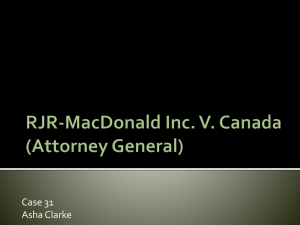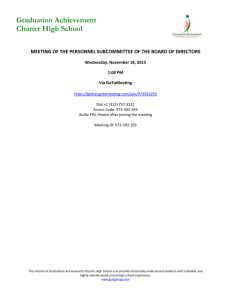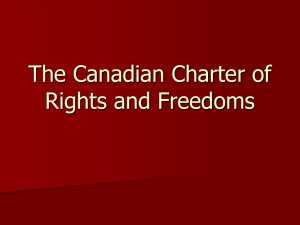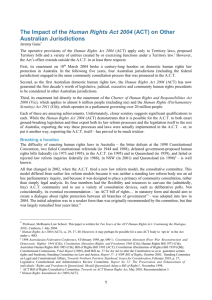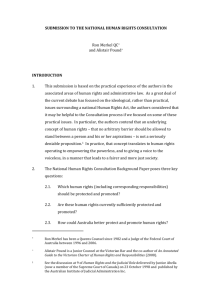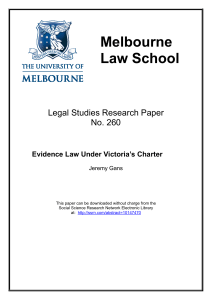Human Rights Dinner - Human Rights Law Centre
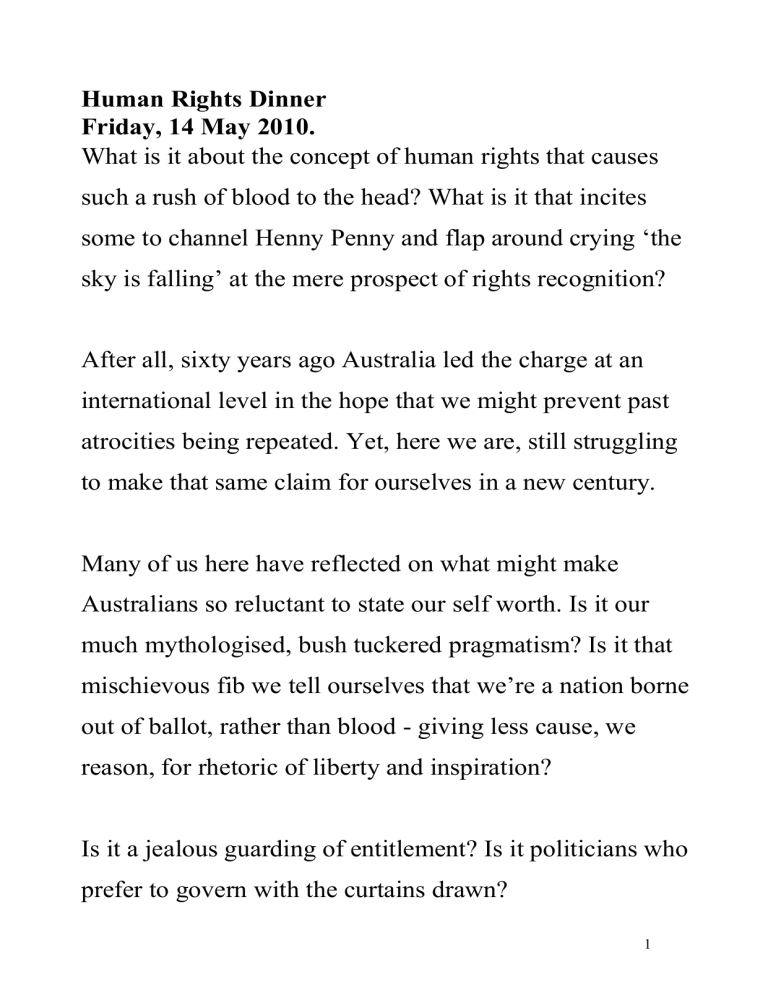
Human Rights Dinner
Friday, 14 May 2010.
What is it about the concept of human rights that causes such a rush of blood to the head? What is it that incites some to channel Henny Penny and flap around crying ‘the sky is falling’ at the mere prospect of rights recognition?
After all, sixty years ago Australia led the charge at an international level in the hope that we might prevent past atrocities being repeated. Yet, here we are, still struggling to make that same claim for ourselves in a new century.
Many of us here have reflected on what might make
Australians so reluctant to state our self worth. Is it our much mythologised, bush tuckered pragmatism? Is it that mischievous fib we tell ourselves that we’re a nation borne out of ballot, rather than blood - giving less cause, we reason, for rhetoric of liberty and inspiration?
Is it a jealous guarding of entitlement? Is it politicians who prefer to govern with the curtains drawn?
1
It could be, and probably is, a mix of all these factors.
What they have in common, however, is that they are a consequence of rights being conceived in the wrong way.
This misconception views rights as an optional extra – a luxury that indulges minorities while imposing an unwanted new tax on the majority’s ability to remain relaxed and comfortable.
Yet the experience in Victoria is entirely the opposite. The experience here has been that, through our Charter of
Human Rights and Responsibilities, human rights – and their companion responsibilities - are every day matters that are considered every day – in services delivered, in laws developed, in decisions made – and in the interests of every Victorian.
Four years into the Charter’s operation, the results have been extremely vindicating. What they have not been, however, is particularly earth shattering.
2
As the CEO of the Victorian Council of Social Services remarked at the launch of the Government’s
A Fairer
Victoria policy for 2010, Victoria is the only Australian jurisdiction to have made such firm statements about the value of its citizens yet, strangely, the sky has not fallen.
Similarly, on that momentous day when I first walked the
Charter into Parliament, I have to say, the foundations remained conspicuously still. No trumpets sounded, no angels sang. Nor were there flocks of cackling judges in the corridors – revelling in their new source of power while ruing their impending jurisprudential isolation.
Alas, then, for those partial to conspiracy, the Charter reality is altogether less exciting. Despite Goosy Lucy’s greatest fears, the judiciary has not usurped the role of
Parliament.
3
Similarly, those wicked forces of political correctness are noticeably absent in the policy development process. What is present, however, is a robust interrogation of every decision from every angle – a social impact statement, if you like, to accompany the economic impact statement that we’ve all come to take for granted.
Even decisions with which some may disagree have been rigorously measured against Charter considerations. No right, after all, is absolute and a Government’s duty is to strike a thoughtful balance and then account for itself in
Parliament – the latter being the clincher in my view.
As we’ve heard, the Charter has affected people’s lives in ways both real and important and, with a review pending - conducted by an independent reviewer, supported by a secretariat within Government and in consultation with bodies represented here – there may well be further ways in which the Charter can improve Victorian lives. None, however, are likely to be the stuff of revolution.
4
Similarly, in the small number of examples in which convicted criminals have attempted to invoke Charter arguments to bolster their case (based on rights, by the way, that have long been recognised by the common law), the outcome has not changed in the vast majority of cases.
In short, despite hopes of a rich vein of soliloquy, lawyers have had to make room in the spotlight for the slightly less glamorous public service – those who develop policy and deliver services – most without the benefit of horsehair.
Why is it then, that, despite the pragmatic but benign success of Victoria’s Charter, the Commonwealth recently disappointed many, including me, by opting for a nonlegislative course – a chart, rather than a Charter or, as one friend of human rights has suggested, ‘the icing without the cake’. Although well intentioned, this approach will lack that fundamental element of accountability and dialogue between arms of Government that are vital features in the
Victorian context.
5
What this speaks to is a view that this is simply too big a step to take: too grand a gesture, too bold a statement of our collective worth. Where, then, does this leave those of us who believe this statement is worth making?
My view is that we need to go back to the drawing board – not in our stance on the importance of rights recognition but in how we communicate this importance to others.
It’s no good arguing it out on the opinion pages of the broadsheets, after all, if the language isn’t resonating.
Human rights are simple and straightforward matters but, as with so much in life, too often we complicate things.
Perhaps, then, we should take a lead from younger generations. All across Victoria, schools use ideas of
‘mutual respect’ and ‘fair play’, without raising an eyebrow – children expecting that everyone should get a fair go, that all should get their turn and feel included.
6
That’s why the Eastern Suburbs Legal Service has had such a fantastic response to its ‘Human Rights are Aussie
Rules’ school campaign, one which explains that, just as there are expectations of fair play on the sports field, human rights are about fairness on the playing field of life.
Just as we could not conduct a fair game of footy without an independent umpire, then, so too we need an independent legal system to resolve disputes and address inappropriate behaviour. Just as rules that outlaw striking and fouls are taken seriously in sport, so too we’re all entitled to go about our lives without threat of violence.
Alternatively, can you imagine going to a footy final without the freedom to wear your team colours, sing your team song or barrack for your favourite footy legend? We might take freedom of assembly, speech or religion for granted in Australia, but the recent controversy about
Islamic dress reminds us how tenuous and subjective our grasp of these concepts really are.
7
The response to this campaign from school kids has been that, really, it’s a bit of a no brainer. Kids know, often better than anyone else, what’s fair and what’s not - a fact that gives me great hope for the future.
It also, however, reminds us that we have a responsibility – right here and now - to guarantee this better future.
I don’t think, for example, that I could look my own children in the eye if I had not continued to make the case for the promotion of their rights.
Conversely, there are those who would see the Federal decision as a victory or, even worse, those who would want
Victoria’s Charter abolished – those who themselves belong to associations which espouse individual liberty as a core value and who cite a belief in the equal rights and dignity of every person on their websites - yet who spiral into a moral panic at the sight of a Charter ship on the horizon.
8
To such people I suggest that they visit any school and explain to those students which one of the following rights they would expect them to relinquish:
Recognition and equality before the law; life; protection from torture and cruel, inhumane or
degrading treatment; freedom from forced work;
freedom of movement; privacy and reputation;
freedom of thought, conscience, religion and belief; freedom of expression; peaceful assembly and
freedom of association; protection of families and children; participation in public life; culture and property; liberty and security of person; humane treatment when deprived of liberty; protection of
children in the criminal justice system; a fair hearing and criminal proceedings rights; protection from being tried or punished more than once and from retrospective criminal laws.
9
None are new. None are revolutionary. All are pretty basic and, given kids are such a tough and honest audience, I sure wouldn’t like to be the one delivering the bad news.
After all, kids understand fair play. They understand equal treatment and inclusion. Like everyone, they don’t always demonstrate it, but at least kids get it. Maybe one day – despite our qualifications, sound bites, mortgages and precedents – we all will too.
10




